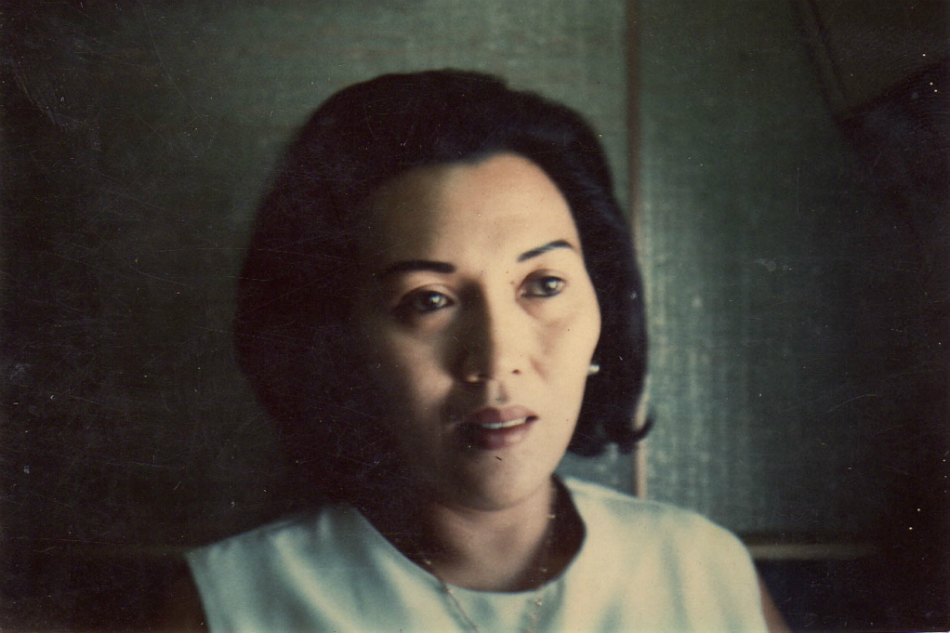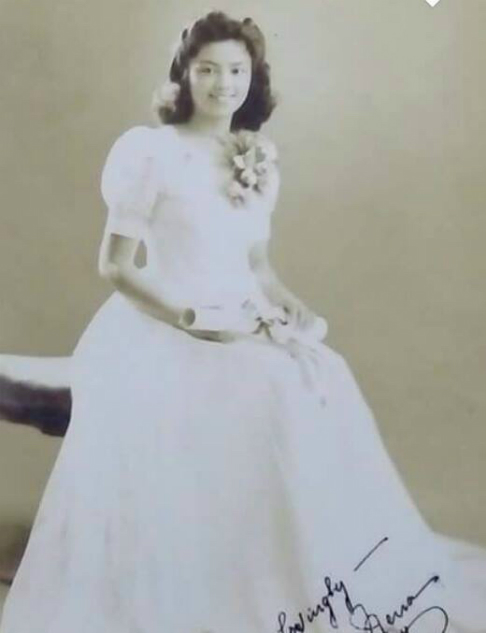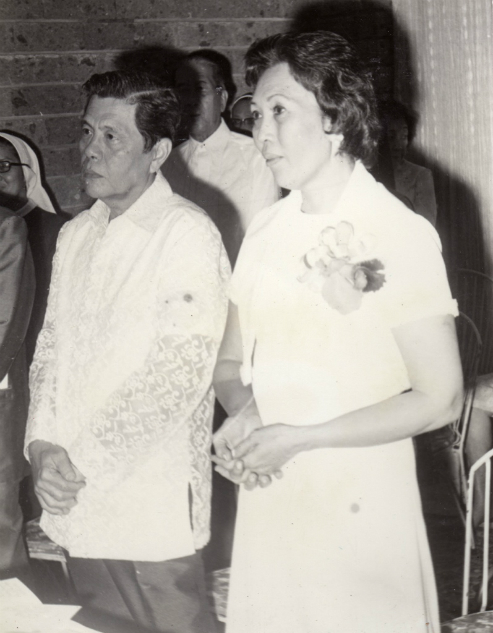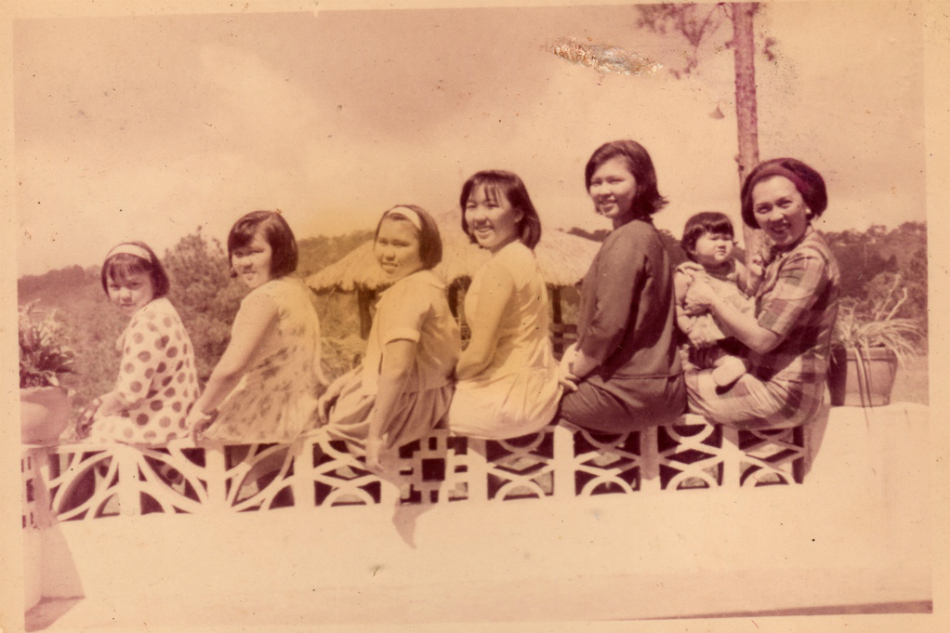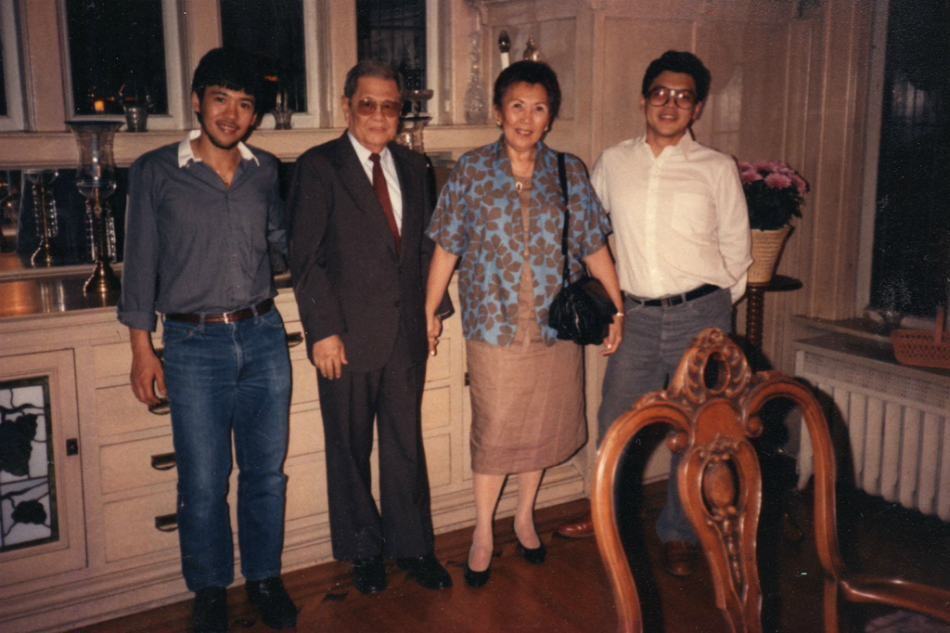Carmen Diokno: Remembering an unsung heroine | ABS-CBN
ADVERTISEMENT

Welcome, Kapamilya! We use cookies to improve your browsing experience. Continuing to use this site means you agree to our use of cookies. Tell me more!
Carmen Diokno: Remembering an unsung heroine
Carmen Diokno: Remembering an unsung heroine
Gerry Lirio,
ABS-CBN News
Published Aug 26, 2019 06:07 AM PHT
HE called her darling in a letter he wrote on the night of December 25 in 1972.
HE called her darling in a letter he wrote on the night of December 25 in 1972.
Jose W. Diokno had been in jail for the past three months without any charge, and here he was on a cold Christmas night, alone and lonely, writing a letter to her, his wife Carmen.
Jose W. Diokno had been in jail for the past three months without any charge, and here he was on a cold Christmas night, alone and lonely, writing a letter to her, his wife Carmen.
“Dear darling,” Diokno wrote, “you and the children have left; and as I foresaw in the last few minutes before you left the stalag. I feel very lonely—-lonelier even than the first days of my detention.” Stalag is a term used once upon a time in Germany referring to camps for prisoners of war.
“Dear darling,” Diokno wrote, “you and the children have left; and as I foresaw in the last few minutes before you left the stalag. I feel very lonely—-lonelier even than the first days of my detention.” Stalag is a term used once upon a time in Germany referring to camps for prisoners of war.
“So I decided to write to you, because it gives me the sensation that you and the children are still here with me, and I am still talking with you and listening to your voice, your laughter, and your singing.”
“So I decided to write to you, because it gives me the sensation that you and the children are still here with me, and I am still talking with you and listening to your voice, your laughter, and your singing.”
ADVERTISEMENT
“Besides, there is one thing I must say to you and the children: Thank you.”
“Besides, there is one thing I must say to you and the children: Thank you.”
Thank you. Diokno couldn’t have thanked Carmen well enough in the letter. He felt sorry for her and their children whose lives his incarceration had interrupted.
Thank you. Diokno couldn’t have thanked Carmen well enough in the letter. He felt sorry for her and their children whose lives his incarceration had interrupted.
Proclamation 1081
He had been in jail several hours after President Marcos placed the entire country under martial law and ordered subsequently the arrest of his critics. Diokno was one of them.
He had been in jail several hours after President Marcos placed the entire country under martial law and ordered subsequently the arrest of his critics. Diokno was one of them.
That night, just a few hours after Malacanang publicized Proclamation No. 1081, the Dioknos were having a party at their sprawling home in Magallanes Subdivision. There were a few guests left when six carloads of armed soldiers arrived looking for the man of the house.
That night, just a few hours after Malacanang publicized Proclamation No. 1081, the Dioknos were having a party at their sprawling home in Magallanes Subdivision. There were a few guests left when six carloads of armed soldiers arrived looking for the man of the house.
It frightened Carmen to see from her bathroom window the soldiers approaching the gates. She wanted to seek help, but all their telephones lines had been cut weeks ago. The soldiers moved in and invited Diokno to join them for questioning to a military camp. They had no warrant. He challenged it. But they refused to leave without him.
It frightened Carmen to see from her bathroom window the soldiers approaching the gates. She wanted to seek help, but all their telephones lines had been cut weeks ago. The soldiers moved in and invited Diokno to join them for questioning to a military camp. They had no warrant. He challenged it. But they refused to leave without him.
ADVERTISEMENT
Carmen ran to the neighborhood to look for a phone. She wanted to call Lorenzo Tanada, or Chino Roces, or any other lawyer, for help. Tañada was abroad; Roces was likewise surrounded by other government agents in his own home. Meanwhile, the soldiers had overwhelmed Diokno and hauled him off to the military car to Camp Crame, headquarters of the Philippine Constabulary.
Carmen ran to the neighborhood to look for a phone. She wanted to call Lorenzo Tanada, or Chino Roces, or any other lawyer, for help. Tañada was abroad; Roces was likewise surrounded by other government agents in his own home. Meanwhile, the soldiers had overwhelmed Diokno and hauled him off to the military car to Camp Crame, headquarters of the Philippine Constabulary.
Solitary confinement
The morning after, Carmen, with probably less than four hours of sleep, rose early to look for her husband in Crame, only to find out that he had been moved later in solitary confinement to the Army headquarters on Fort Bonifacio. There she also found Roces, Senators Benigno Aquino Jr. and Ramon Mitra, and several other Marcos critics and opposition leaders in separate, nearby cells.
The morning after, Carmen, with probably less than four hours of sleep, rose early to look for her husband in Crame, only to find out that he had been moved later in solitary confinement to the Army headquarters on Fort Bonifacio. There she also found Roces, Senators Benigno Aquino Jr. and Ramon Mitra, and several other Marcos critics and opposition leaders in separate, nearby cells.
In the weeks that followed, it became crystal clear: life had changed for Diokno, an incumbent senator, former justice secretary, and 1944 bar topnotcher, and for his wife Carmen, and for their 10 children.
In the weeks that followed, it became crystal clear: life had changed for Diokno, an incumbent senator, former justice secretary, and 1944 bar topnotcher, and for his wife Carmen, and for their 10 children.
Diokno felt sorry for the burden Carmen had to bear, for raising the family by her lonesome, and for paying the price of being the wife of a Marcos critic. But she stood by him. She explained to the 10 children that their father had been arrested because he was fighting for something that the Marcos government wanted to suppress.
Diokno felt sorry for the burden Carmen had to bear, for raising the family by her lonesome, and for paying the price of being the wife of a Marcos critic. But she stood by him. She explained to the 10 children that their father had been arrested because he was fighting for something that the Marcos government wanted to suppress.
“She made sure that we understood that he was leaving us, not because he did something wrong. We were told we should be proud of him because he did something right,’’ said Pat, the third child, in an interview with this newsman one Sunday in Quezon City.
“She made sure that we understood that he was leaving us, not because he did something wrong. We were told we should be proud of him because he did something right,’’ said Pat, the third child, in an interview with this newsman one Sunday in Quezon City.
ADVERTISEMENT
She smoked a lot
Recalling their father’s arrest, Pat and the sixth child Cookie said it was likewise a miracle that their mother’s was able to put up a brave front. “She was a very strong woman,” said Cookie.
Recalling their father’s arrest, Pat and the sixth child Cookie said it was likewise a miracle that their mother’s was able to put up a brave front. “She was a very strong woman,” said Cookie.
Carmen didn’t cry, but she began smoking more cigarettes than usual, two other children remembered.
Carmen didn’t cry, but she began smoking more cigarettes than usual, two other children remembered.
From his stalag, Diokno wrote in his December 25 letter: “Thank you for coming every day, disregarding the humiliations and inconveniences of your visits, and overlooking my all too frequent petulance and moodiness, to cheer me up and give me the courage to hold on. You have made me see clearly that we are fighting together, that what we strive for is good and just, and that I must not give up or agree to anything that violates what we believe in and stand for.”
From his stalag, Diokno wrote in his December 25 letter: “Thank you for coming every day, disregarding the humiliations and inconveniences of your visits, and overlooking my all too frequent petulance and moodiness, to cheer me up and give me the courage to hold on. You have made me see clearly that we are fighting together, that what we strive for is good and just, and that I must not give up or agree to anything that violates what we believe in and stand for.”
“Thank you for giving me today the best Christmas gift I have ever received. To have you share my sorrow and uncomfortable mattress on the cement floor, to feel you at my side bustling about putting some order and cleanliness in our dining area, to see our children squeezing themselves into my cramped cubicle, the girls cleaning up, the boys running errands, all not only uncomplaining, but cheerful, though I knew they could have spent the day much more comfortably and enjoyably elsewhere—I could not ask for more.
“Thank you for giving me today the best Christmas gift I have ever received. To have you share my sorrow and uncomfortable mattress on the cement floor, to feel you at my side bustling about putting some order and cleanliness in our dining area, to see our children squeezing themselves into my cramped cubicle, the girls cleaning up, the boys running errands, all not only uncomplaining, but cheerful, though I knew they could have spent the day much more comfortably and enjoyably elsewhere—I could not ask for more.
“Today, you made me feel the spirit of giving that is the very essence of Christmas, as I have never felt it before; and I am sorry that I have so little to give you in return. Now more than ever before, I am determined to do what lies within me to see to it that you and the children and our people need never again spend another Christmas in the shadow of injustice and oppression cast by one man’s unreasoning fear, and his insatiable lust for power and wealth.
“Today, you made me feel the spirit of giving that is the very essence of Christmas, as I have never felt it before; and I am sorry that I have so little to give you in return. Now more than ever before, I am determined to do what lies within me to see to it that you and the children and our people need never again spend another Christmas in the shadow of injustice and oppression cast by one man’s unreasoning fear, and his insatiable lust for power and wealth.
ADVERTISEMENT
“So for courage and hope and determination, for teaching me what it means to give of one’s self, thank you.
“So for courage and hope and determination, for teaching me what it means to give of one’s self, thank you.
“Thank you, above all else, for being you, each of you, and for being mine.
“Thank you, above all else, for being you, each of you, and for being mine.
“Love, Dad”
“Love, Dad”
Love at first sight?
Carmen Icasiano, a commerce student from Far Eastern University whose family hailed from Bulacan, and Diokno, a very promising new lawyer, met for the first time in 1946 at a dinner party hosted by his friend Arsenio Lacson, who would later become mayor of Manila.
Carmen Icasiano, a commerce student from Far Eastern University whose family hailed from Bulacan, and Diokno, a very promising new lawyer, met for the first time in 1946 at a dinner party hosted by his friend Arsenio Lacson, who would later become mayor of Manila.
She came escorted by an American colonel. He arrived with his date, Baby Quezon, a sister of Manuel Quezon. They all sat at the same, assigned table. She looked pretty, he sounded brilliant. It might have been love at first sight: The moment they were introduced, they looked at each other, they talked to each other, and most of the times only to each other, as if nothing else mattered, but everybody else quizzically took notice.
She came escorted by an American colonel. He arrived with his date, Baby Quezon, a sister of Manuel Quezon. They all sat at the same, assigned table. She looked pretty, he sounded brilliant. It might have been love at first sight: The moment they were introduced, they looked at each other, they talked to each other, and most of the times only to each other, as if nothing else mattered, but everybody else quizzically took notice.
ADVERTISEMENT
From then on, the two didn’t stop seeing each other. When he was sent to the United States as his father’s reward for topping the bar, Diokno called Carmen frequently via long distance at an agreed, appointed time. Each time, she had to go downtown at a provincial telephone station to wait for his call. When she got sick and missed several calls, he cut his trip short to see her, and on her sickbed, he asked for her hand. The two got married at a Manila Catholic church.
From then on, the two didn’t stop seeing each other. When he was sent to the United States as his father’s reward for topping the bar, Diokno called Carmen frequently via long distance at an agreed, appointed time. Each time, she had to go downtown at a provincial telephone station to wait for his call. When she got sick and missed several calls, he cut his trip short to see her, and on her sickbed, he asked for her hand. The two got married at a Manila Catholic church.
Over time, Diokno engaged in law practice and reaped fame for his successful handling of election and criminal cases, including a libel case against tough- talking Lacson, prompting President Macapagal to appoint him Justice secretary in December 1961.
Over time, Diokno engaged in law practice and reaped fame for his successful handling of election and criminal cases, including a libel case against tough- talking Lacson, prompting President Macapagal to appoint him Justice secretary in December 1961.
But his stint didn’t last long. Diokno ordered an investigation and a raid in March 1962 on a firm owned by American businessman Harry Stonehill for alleged tax evasion and for bribing public officials. Macapagal intervened, allowing Stonehill to leave the country. He asked Diokno to resign.
But his stint didn’t last long. Diokno ordered an investigation and a raid in March 1962 on a firm owned by American businessman Harry Stonehill for alleged tax evasion and for bribing public officials. Macapagal intervened, allowing Stonehill to leave the country. He asked Diokno to resign.
But it launched his political career. He ran and won a Senate seat, serving for two terms from 1963 to 1972.
But it launched his political career. He ran and won a Senate seat, serving for two terms from 1963 to 1972.
In the early 1970s, Diokno sensed a shift in the Marcos presidency toward dictatorship. The two were members of the Nacionalista Party, but when Marcos suspended the privilege of the writ of habeas corpus after the Plaza Miranda bombing in August 1971, Diokno resigned from the party in protest and took to the streets. He called on Marcos to respect human rights: “No cause is more worthy than the cause of human rights... they are what makes a man human. Deny them and you deny man's humanity."
In the early 1970s, Diokno sensed a shift in the Marcos presidency toward dictatorship. The two were members of the Nacionalista Party, but when Marcos suspended the privilege of the writ of habeas corpus after the Plaza Miranda bombing in August 1971, Diokno resigned from the party in protest and took to the streets. He called on Marcos to respect human rights: “No cause is more worthy than the cause of human rights... they are what makes a man human. Deny them and you deny man's humanity."
ADVERTISEMENT
From one house to another
While Diokno built a formidable legal and political career, the children came one after the other. First, there was Carmen or Mench, then Jose Ramon, then Pat, Maris, Maite, Maria Socorro, Jose Miguel, Chel, then Maria Victoria, and the last, Martin. The family moved from one house to another, from Roxas Boulevard to Magallanes, all by anyone’s standards, living an upper middle class, comfortable lifestyle.
While Diokno built a formidable legal and political career, the children came one after the other. First, there was Carmen or Mench, then Jose Ramon, then Pat, Maris, Maite, Maria Socorro, Jose Miguel, Chel, then Maria Victoria, and the last, Martin. The family moved from one house to another, from Roxas Boulevard to Magallanes, all by anyone’s standards, living an upper middle class, comfortable lifestyle.
Then came martial law, obviously one of the darkest episodes in the country’s history. It was a turning point for the family. Carmen asked some of the children to stop schooling. To keep both ends meet, she decided to sell the Magallanes home to Filipino Chinese businessman William Tieng. Old friends became scarce. They moved to New Manila.
Then came martial law, obviously one of the darkest episodes in the country’s history. It was a turning point for the family. Carmen asked some of the children to stop schooling. To keep both ends meet, she decided to sell the Magallanes home to Filipino Chinese businessman William Tieng. Old friends became scarce. They moved to New Manila.
Letter to Mench
In another, much longer letter sent eight months later, dated August 26, 1973, this time to Mench, their eldest, Diokno wrote:
In another, much longer letter sent eight months later, dated August 26, 1973, this time to Mench, their eldest, Diokno wrote:
“Your mother had to make the violently sudden transition from wife to widow--a widow, moreover, with husband whose health, safety and future she worried about, besides having to cope alone with the myriad problems or providing for, and bringing up, our children. Yet, she has done so well, that I have at times, thought that she was shield me from our problems.
“Your mother had to make the violently sudden transition from wife to widow--a widow, moreover, with husband whose health, safety and future she worried about, besides having to cope alone with the myriad problems or providing for, and bringing up, our children. Yet, she has done so well, that I have at times, thought that she was shield me from our problems.
“There I think is the secret of your mother’s strength—her fierce instinct as a wife and mother; and she has been the source of fortitude that has sustained us all during these eleven months of my detention.
“There I think is the secret of your mother’s strength—her fierce instinct as a wife and mother; and she has been the source of fortitude that has sustained us all during these eleven months of my detention.
ADVERTISEMENT
Carmen’s best
“There is so much that you and your sisters should learn from her. Her common sense, her practical approach to things, her courage and her love for us that enabled her to bear the difficulties and humiliations of these months, not only without complaining or despairing, but with proud dignity and firm hope—these are qualities that I hope all of you, my daughters, have acquired in some measure. Even her faults are really her virtues carried to excess.
“There is so much that you and your sisters should learn from her. Her common sense, her practical approach to things, her courage and her love for us that enabled her to bear the difficulties and humiliations of these months, not only without complaining or despairing, but with proud dignity and firm hope—these are qualities that I hope all of you, my daughters, have acquired in some measure. Even her faults are really her virtues carried to excess.
“I am sure that these months have been harder on her than on me. For I have always been confident that God would not abandon our family, and that your mother would be more than capable of making things work out. The events have justified my faith; in fact, sometimes I think that the family has done better than it would have had I been with them.
“I am sure that these months have been harder on her than on me. For I have always been confident that God would not abandon our family, and that your mother would be more than capable of making things work out. The events have justified my faith; in fact, sometimes I think that the family has done better than it would have had I been with them.
“If you and your sisters can, each in her own way, do half as your mother, your husbands will have reason to say, as I do, that the Lord has always been good to me but never so good as the day your mother married me.
“If you and your sisters can, each in her own way, do half as your mother, your husbands will have reason to say, as I do, that the Lord has always been good to me but never so good as the day your mother married me.
Uncharged, unbowed, unbent
“I still don’t know if any charges have been filed against me or, if so, for what; or if I am to be released or when. Either way, as soon I know, I shall try to tell your mother, so she can let you know right away.”
“I still don’t know if any charges have been filed against me or, if so, for what; or if I am to be released or when. Either way, as soon I know, I shall try to tell your mother, so she can let you know right away.”
Diokno was released after two years still without any charges on September 11, 1974, Marcos's 57th birthday. He rejoined the anti-Marcos movement, including defending Marcos’ human rights victims.
Diokno was released after two years still without any charges on September 11, 1974, Marcos's 57th birthday. He rejoined the anti-Marcos movement, including defending Marcos’ human rights victims.
ADVERTISEMENT
In 1986, President Corazon Aquino appointed him chair of the newly-created Commission on Human Rights. Months later, he resigned horrified with the deaths of so many civilians in what is now known as the Mendiola Massacre in January 1987. He died a month later, one day after his 65th birthday, leaving Carmen and their children for good.
In 1986, President Corazon Aquino appointed him chair of the newly-created Commission on Human Rights. Months later, he resigned horrified with the deaths of so many civilians in what is now known as the Mendiola Massacre in January 1987. He died a month later, one day after his 65th birthday, leaving Carmen and their children for good.
Carmen moved to live with one of her children inside UP campus. She didn’t marry again. But neither did she fall for another man.
Carmen moved to live with one of her children inside UP campus. She didn’t marry again. But neither did she fall for another man.
“When I met your father, he was the only friend I ever wanted,” one of the children quoted as her saying.
“When I met your father, he was the only friend I ever wanted,” one of the children quoted as her saying.
“And when I married him. I didn’t feel the need for any other friend.”
“And when I married him. I didn’t feel the need for any other friend.”
Carmen Diokno died on August 26, 2011. She was 87.
Carmen Diokno died on August 26, 2011. She was 87.
Photos and videos courtesy of Diokno family
ADVERTISEMENT
ADVERTISEMENT



